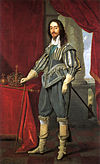Charles I was King of England, Scotland, and Ireland from 27 March 1625, until his execution. He famously engaged in a struggle for power with Parliament; he was an advocate of the divine right of kings. Many in England therefore feared that he was attempting to gain absolute power. There was widespread opposition to many of his actions, especially the levying of taxes without Parliament's consent. This is one of the many manifestations of popular discontent with an absolute monarchy. The last years of Charles's reign were marked by the English Civil War; he was opposed by the forces of Parliament and by Puritans. The war ended in defeat for Charles, who was subsequently tried, convicted and executed for high treason. The monarchy was overthrown, and a republic was established. (more...)
Recently featured: Prostate cancer – Imperial Japanese Navy – €2 commemorative coins
